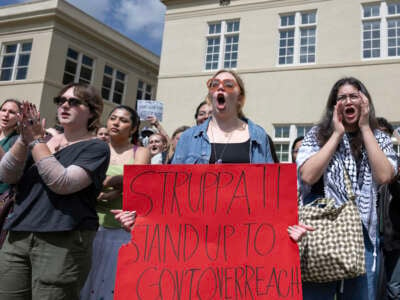Part of the Series
Struggle and Solidarity: Writing Toward Palestinian Liberation
Near the end of March, Gary Wilder, a professor of anthropology at the City University of New York, sent an email about his decision to decline attending a conference at Columbia University, explaining he was doing so because Columbia is “actively colluding with the U.S. government’s project to destroy higher education and criminalize dissent.”
“A boycott is one of the few instruments available to the academic community through which to censure Columbia,” Wilder wrote to many of those involved in the gathering.
Wilder is one of more than 1,800 academics and 50 organizations who have joined a quickly expanding boycott of Columbia, which has been at the center of U.S. state and political repression surrounding activism for Palestinian liberation.
This boycott is in line with the position taken by the American Association of University Professors (AAUP) that “institutions of higher education that themselves violate academic freedom or the fundamental rights upon which academic freedom depends” are legitimate targets of academic boycotts.
As professors, we have watched with increasing horror as the Trump administration wages war against universities, students and faculty which aims not only to undermine institutional autonomy, but also to transform these campuses into an arm of the security state. And we have watched with equal horror as these universities have elected to capitulate to this repression, choosing to place their students, faculty and staff at great risk.
No university has acquiesced as eagerly and fully as Columbia. The lengths to which administrators have been willing to go also suggests their actions are not mere capitulation, but rather a strategic alignment with the Trump administration.
Last year, Columbia invited the New York Police Department onto its campus, which resulted in the brutalizing and arrest of students protesting genocide. This prompted the first organized boycott of the institution. Since then, Columbia’s leadership has disciplined, suspended and expelled students, failed to protect Palestine supporters from relentless harassment and doxxing, and hounded faculty who dare stand up for their students and long-established principles of academic freedom.
Since Trump’s return to the Oval Office, Columbia’s regime of oppression against its own faculty, students and staff has intensified. On March 5, nine Barnard students were arrested for staging a sit-in to demand the administration reverse the prior expulsions of three student activists. Soon after, Columbia updated its public safety protocols to allow U.S. Immigration and Customs Enforcement, or ICE, on campus without a judicial warrant in the case of “exigent circumstances.”
Then, on March 8, Mahmoud Khalil, a recent master’s graduate who was a lead negotiator with the Columbia administration during the Gaza solidarity encampment, was detained by ICE. Khalil had endured months of doxxing by the pro-Israel site Canary Mission, by the more recently formed group, Documenting Jew Hatred on Campus and by members of Columbia’s own faculty who called for his deportation. He had also been subject to disciplinary investigations by Columbia’s newly created Office of Institutional Equity. Columbia never responded to his email pleading the university for protection the day before his detainment.
Khalil is not the only student Columbia has endangered. On March 11, Ranjani Srinivasan, an international graduate student whose visa was revoked by the Department of Homeland Security on the spurious charge of being “involved in activities supporting Hamas,” fled into hiding and eventually to Canada after Columbia withdrew her from her Ph.D. program and the university’s campus security allegedly allowed ICE into her apartment. Two days later, Columbia allegedly allowed ICE into the dorm room of Yunseo Chung, a junior at Columbia who was arrested at a pro-Palestine protest. Chung, who has been in the U.S. since the age of 7, has since sued the government to prevent her deportation.
That same day, 20 more students were expelled, including Grant Miner, the president of the student workers union. The timing speaks volumes. The Trump administration had delivered what Katherine Franke, a Columbia faculty member forced into early retirement for her pro-Palestine views, called a “ransom note.” It gave the university a week to, among other things, suspend or expel student activists, centralize disciplinary procedures in the Office of the Provost, implement severe restrictions on public assembly, adopt the definition of anti-Zionism as antisemitism, and impose administrative oversight of the Middle East, South Asian, and African Studies Department as well as the Institute for Israel and Jewish Studies and the university’s Tel Aviv program.
Columbia not only acquiesced to all the demands of said letter, but exceeded Trump’s dictates by suspending faculty governance of the Center for Palestine Studies, the only such center in the country, and placing it, along with other departments and institutes, under the purview of a senior vice provost appointed by the administration.
Boycotts are imperfect tools. As we were writing the most recent boycott letter, we spoke to Columbia students who are distraught at the horrors faced by their peers, and are worried about their own futures. We spoke to faculty who support the call for boycott, while others are concerned a boycott will amount to a further suppression of their voices.
We are calling for a renewed push around the boycott because of Columbia’s flagrant violation of academic freedom and faculty governance. We cannot conduct business as usual until Columbia’s administrators reverse their decision to disenroll, expel and suspend students. We cannot give colloquia and sit on panels until they reject Trump’s demands to censor programming and suppress oppositional voices on campus.
We say this as we remain committed to standing with Columbia faculty, students and staff whose lives are irreparably altered. We are committed to standing with them against an institution that has abdicated its responsibility towards them and set a precedent that impacts every person who cares about education and free speech in this nation.
We all know that when faced with this type of repression, institutions — particularly those with multibillion-dollar endowments like Columbia — always have a choice. Just this week, Tufts University released a clear declaration of support for their student, Rümeysa Öztürk. The Rutgers University Senate has passed a resolution to form a “mutual defense compact” among Big Ten schools to provide mutual financial and legal support in defending against federal incursions. Researchers from the University of Michigan, the University of New Mexico and Harvard University have joined a lawsuit opposing the termination of National Institutes of Health grants. When universities have failed to act, faculty associations themselves have stepped up. AAUP and the Middle East Studies Association have filed a suit to prevent the deportation of students and faculty who have participated in pro-Palestine protests. AAUP and the American Federation of Teachers are also suing the Trump administration to restore the $400 million in federal grants and contracts to Columbia University.
These acts of resistance are vital because academic freedom is a cornerstone of democracy. Aspiring dictators know this all too well. In Turkey, which observers have noted appears to be a political model for Trump, academics were purged from their jobs and jailed in the aftermath of a 2016 coup attempt, and many who have remained live under constant fear of being reported to authorities by students. Hungary’s Central European University was forced to relocate to Vienna in 2019 after Viktor Orbán’s government passed legislation preventing it from issuing U.S.-accredited degrees. In India, dissident students and faculty have been physically attacked and jailed on manufactured charges, and universities there have been forced into ideological conformity with Narendra Modi’s Hindu nationalist project.
While we acknowledge and understand that many of our colleagues and friends are frightened to speak out, we believe that acquiescence is not an option. The violence targeting universities pales in comparison to the violence that students and faculty are protesting: the scholasticide and genocide in Gaza.
For those of us with the privilege to do so, the only option is to oppose the repression here and the devastation which unfathomably continues there, to withhold our labor and presence from Columbia, and to do so collectively — and loudly.
This article is a joint publication between Truthout and In These Times.
We’re not backing down in the face of Trump’s threats.
As Donald Trump is inaugurated a second time, independent media organizations are faced with urgent mandates: Tell the truth more loudly than ever before. Do that work even as our standard modes of distribution (such as social media platforms) are being manipulated and curtailed by forces of fascist repression and ruthless capitalism. Do that work even as journalism and journalists face targeted attacks, including from the government itself. And do that work in community, never forgetting that we’re not shouting into a faceless void – we’re reaching out to real people amid a life-threatening political climate.
Our task is formidable, and it requires us to ground ourselves in our principles, remind ourselves of our utility, dig in and commit.
As a dizzying number of corporate news organizations – either through need or greed – rush to implement new ways to further monetize their content, and others acquiesce to Trump’s wishes, now is a time for movement media-makers to double down on community-first models.
At Truthout, we are reaffirming our commitments on this front: We won’t run ads or have a paywall because we believe that everyone should have access to information, and that access should exist without barriers and free of distractions from craven corporate interests. We recognize the implications for democracy when information-seekers click a link only to find the article trapped behind a paywall or buried on a page with dozens of invasive ads. The laws of capitalism dictate an unending increase in monetization, and much of the media simply follows those laws. Truthout and many of our peers are dedicating ourselves to following other paths – a commitment which feels vital in a moment when corporations are evermore overtly embedded in government.
Over 80 percent of Truthout‘s funding comes from small individual donations from our community of readers, and the remaining 20 percent comes from a handful of social justice-oriented foundations. Over a third of our total budget is supported by recurring monthly donors, many of whom give because they want to help us keep Truthout barrier-free for everyone.
You can help by giving today. Whether you can make a small monthly donation or a larger gift, Truthout only works with your support.
Read full article at source
Stay informed about this story by subscribing to our regular Newsletter


